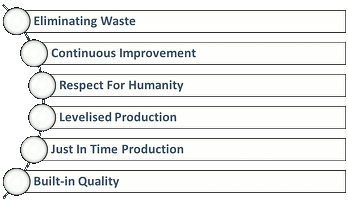Understanding the principles of 'lean' is key to being able to make use of them in any organisation. There are countless lean manufacturing case studies that suggest following the guiding lean manufacturing principles will lead to improved profitability and higher customer satisfaction levels. Aimed primarily at cutting waste, these principles are tried and tested.

What is Lean Manufacturing?
Lean manufacturing works on the principle that eliminating any costs that do not result in value to the end user can improve quality and profitability. Of the many lean manufacturing case studies
1. Eliminating Waste
Toyota Production System (TPS) that demonstrates just how powerful the lean manufacturing principles can be. The Japanese car-maker has enjoyed steady growth over the last two decades to become a dominant force in the automotive industry; it owes much of its success to the primary lean manufacturing principles, of which there are six.
One of the primary lean manufacturing principles is the minimisation of waste. This involves cutting production levels, minimising production defects and reducing production times. Other factors such as cutting out unnecessary motion, transportation and processing combine to make the production process as lean and efficient as possible. And although these principles are geared towards industry, there are many lean manufacturing case studies that suggest the 'lean' ethos can be applied to almost any commercial environment.
2. Continuous Improvement
Business processes, production methods and efficiencies should be constantly up for review. At every stage of the production process, and amongst every level of worker, the need to constantly strive for efficiencies and savings should be as natural as the processes themselves. Any change, no matter how small, can play its part in creating a more streamlined, efficient process.
3. Respect For Humanity
A successful business relies on its workforce. There is clear evidence - found by examining various lean manufacturing case studies - that happy, motivated workers are more efficient. A worker who feels valued, respected and well-rewarded is highly likely to perform well, and that can contribute significantly to a company's success. This respect for workers can involve something as fundamental as a fair, living wage, or something very simple such as regular communication from management.
4. Levelised Production
The ebb and flow of customer demand can leave some manufacturers constantly adjusting to changes in production schedules. This can lead to waste and significant inefficiencies according to recent lean manufacturing case studies. However, by combining accurate forecasting with historical sales data, companies can avoid huge fluctuations in production levels. By levelling out production, companies are not at the mercy of the day-to-day variances of supply and demand.
5. Just In Time Production
This is one of the lean manufacturing principles that works in conjunction with levelised production. Just in Time (JIT) production involves building or producing only what is needed, when it is needed. This means that materials, manpower and components are only utilised when an order has been placed. No time or resources are expended in the production of an unsaleable product.
6. Built-in Quality
Perhaps one of the most complex lean manufacturing principles is the desire to include quality in every stage of the production process. From the moving parts of machinery involved in production to the packaging at the very end of the process, every component of the production line is infused with quality. Amongst the lean manufacturing case studies that demonstrate the importance of built-in quality include automated defect detectors that catch sub-standard products before they are sent out to the customer. Other processes involve automated systems orientating component parts correctly; a process that would otherwise be susceptible to errors if left only to humans. Of course, there are other lean manufacturing principles, but these six are perhaps the most important, and they truly define what is meant by the 'lean' ethos. The various lean manufacturing case studies available - including those of Nissan and BMW - prove that by removing unnecessary processes, wasted time and wasted commodities, companies can become more profitable and deliver a better product for the end user.





.png?width=137&height=137&name=MicrosoftTeams-image%20(4).png)